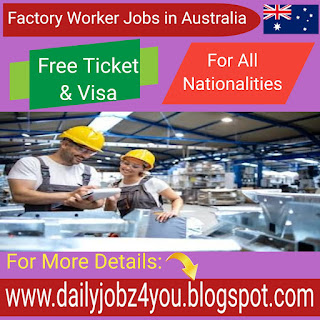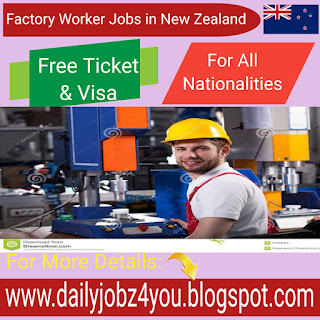Factory Workers hiring in Australia:
Factory workers in Australia are in high demand, and there are many opportunities available:
 |
| Urgently Required Factory Workers in Australia |
Labor demand in Australia is at an
all-time high, with many high-skilled industries such as healthcare and
professional, scientific and technical services leading the way. However,
Australia is not the only market facing labor shortages. Many target countries
are looking for skilled workers. UK tech vacancies hit record high in Q1
2022.6, total Canadian vacancies up 61% year-on-year
Many job vacancies in Australia are
in high-skilled industries. Health and social care are the sectors most in need
of labor. In addition, professional, scientific and technical services agencies
report the third-highest number of job vacancies across Australia's 18
industries combined.
Are your skills in high demand in
Australia? Check out the most in-demand jobs in Australia in 2022 below. With
the coronavirus pandemic over and Australia trying to get its economy back on
track, this is the best chance in years to improve your employment prospects
and relocate to Australia. Australia is currently facing a national skills
shortage in many occupations. The government plans to fill the gap by training
local Australians and recruiting migrants.
Factory
workers can earn a good income in Australia:
The average wage for factory workers
in Australia is $49,517 a year and $24 an hour. Average wages for factory
workers ranged from $37,583 to $57,638. On average, degrees below the HS are
the highest level of education for factory workers. This pay analysis is based
on wage survey data collected directly from Australian employers and anonymous
workers.
The average gross wage for factory
workers in Melbourne, Australia, is $50,372, or the equivalent of $24 an hour.
This is 2% (+$896) higher than the average Australian factory worker's salary.
On top of that, their average bonus is $630. Wage estimates are based on wage
survey data collected directly from employers and anonymous workers in
Melbourne, Australia. The average wage for entry-level factory workers (1-3
years of experience) is $42,246. On the other hand, a senior factory worker
(with at least 8 years of experience) earns an average salary of $59,745.
This has always been a draw for
non-Australian residents looking to work there. It has a lot to do with
lifestyle, salary, and of course good weather. Australia has always had a clear
and fair immigration policy, welcoming foreign and migrant workers. So if you
are planning to move and you are eligible, you will feel accepted.
Factory Workers hiring in New Zealand:
New Zealand factory workers are in high demand due to strong economic growth:
 |
| Urgently Required Factory Workers in New Zealand |
We've looked at job market trends
across the 20 industries and sectors we've recruited for in New Zealand, and
here are the top 5 skills most in demand by companies across the country. These
are the skills that are most in demand relative to supply. We focus on job
titles to show precise hard skills or technical skills at the forefront of
supply and demand imbalances. If you're interested in the hottest soft skills,
we've also compiled seven job-ready soft skills you need today.
Jobs mentioned in the list that are
currently in high demand are believed to be because of a current shortage of
skilled workers or because of forecasts of increased demand in the future.
However, like the rest of the world, certain areas of employment in New Zealand
are in high demand and will likely remain so to some extent for the foreseeable
future. These positions are typically in service sectors, including health and
social services, engineering and science. But one common thread on the skills
shortage lists in many countries is jobs in emerging global markets such as
ICT. Some of these positions have been on the skills shortage list since its
inception, with no signs of being removed.
Skilled plumbers, machine operators
and construction workers are in high demand in New Zealand's busy construction
market. Employers need qualified, ticketed drains and experienced machine
operators who can pass drug tests, have their own transportation and be willing
to travel. Reliability is a must.
Factory
workers in New Zealand are hiring rapidly, according to a recent report:
From early 2010 to early 2013,
employment grew by 2.7% - slower than output growth of 6.3%, leading to a brief
spike in labor productivity. As employment growth accelerated in 2013, the net
migration rate rose, reflecting an increase in international migration and a
net increase in returning New Zealanders. Thanks to New Zealand's skills-based
immigration policy, net migration has helped increase the country's average
skill level.
Talent acquisition professionals are
extremely scarce, especially those with technical experience or high volume
recruits. Active sourcing expertise is appreciated. The right employee must
have a well-established network and proven experience in finding talent in a
market with a shortage of candidates. Employers also need experience managing
large portfolios, as well as the ability to work fast, think creatively and be
solution-oriented. Strong stakeholder engagement, communication and
expectations management skills are valued. With the rapid development of the
industry, candidates with experience in technical disciplines are especially in
demand.
In addition to healthcare professionals,
job openings in sectors not affected (or only marginally) by containment
measures and enforced physical shutdowns have also increased in other specific
industries. These jobs are mainly in the areas of logistics and sales. For
example, in Austria, the UK and the US, online job opportunities in the order
processing and packaging industries have increased by almost 50% compared to
the beginning of the year, reflecting a significant increase in online shopping
and related deliveries due to social distancing measures and fears of catching
the virus while away from home , sell directly to customers.
Go and Apply On The Authority Website
